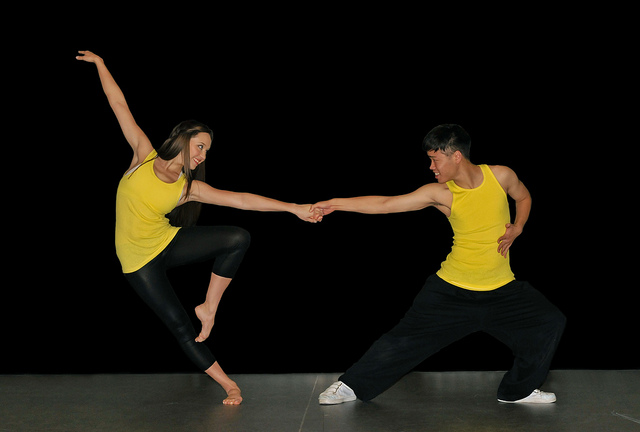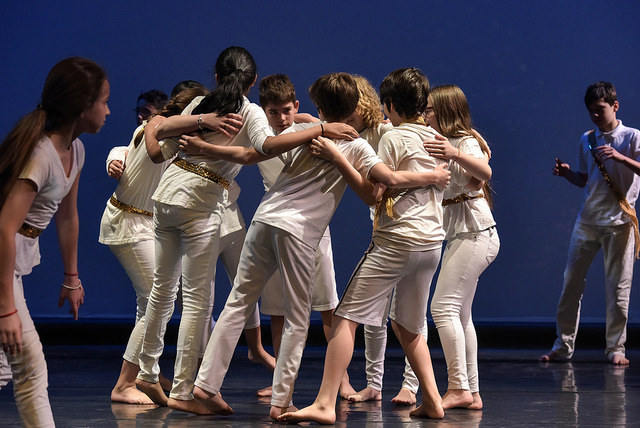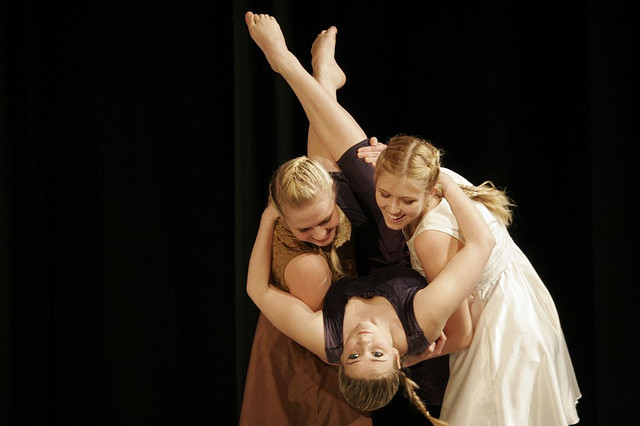
Brendan. Licensed under CC
Attribution 2.0 Generic.
by Lucy Vurusic Riner
There is a lot of talk that typically surrounds the plight of the millennial. Did their parents raise them to be self-sufficient? What sort of work ethic do they have? How do their values and morals play out in today’s workforce?
And, for me as a teacher, how do I impart my “Gen X wisdom” on them in dance class?
I wonder about this each day as I watch my students come into class. They really do toggle back and forth from being complete perfectionists and go-getters to being completely entitled and lazy. As a parent I wonder when their character will begin to take shape and how much influence their own parents have over the kinds of humans that are walking into my dance class each day. As an executive director of a dance company I wonder if I would hire more than a fraction of them upon graduating from college.
Attitude matters these days.
Teaching high school dancers (and I believe this extends well into college as well) is challenging in that most of our students are setting goals that are superficial; or what I like to call surface level. They read the syllabus or the rubric to see what they need to do to get the A or get cast in the role and then they simply do the bare minimum to make that happen. There is a preconceived notion that if you’ve done all the work, you now deserve the job. Period. The problem is that a lot of them can do the work. A lot of them can even do the work well; but there aren’t enough jobs for the amount of dancers we’re cranking out these days.
We need to teach them that doing the work is standard. It’s status quo. It’s the bare minimum expectation. It’s what happens after you’ve done part one that leaves an impression. It’s more than just bringing your skills and talents. Attitude, character and work ethic matter.

Steven Pisano. Licensed under CC Attribution 2.0 Generic.
My belief has always been pretty cut and dried: I want my students to be good people first. Yes, they walk into my class each day in a leotard and leggings and are expected to learn “the moves” but as they walk in I also expect them to greet each other and maybe have a short dialogue. As class continues I want them to pay attention and challenge themselves. I want them to ask questions, maybe even make a few jokes, and I want to see dance bringing them joy as they develop into strong young women and men.
I think if I asked my students to make a list of what they believe a teacher, employer or even a parent might expect of them, having a good attitude and developing a respectable character might not make that list. I know that with my own children I often remind myself that the first questions I want to ask are: Did you enjoy yourself? What did you learn? How do you feel about it? Rather what typically comes out first is: What grade did you get? What part did you get? How did others do? We place such on emphasis on grades, technique, competition, etc. that we don’t spend very much time at all talking to our students about resilience, work ethic and character.
When I think back to my first years of teaching, I can remember several profoundly talented dancers that were not nice girls. Actually, they were pretty horrible. They talked during class, were not respectful of my teaching and although they were natural dancers; they were lazy. I hoped when they left high school that they’d mature, but what I secretly hoped for more was that no one would hire them. Because although they were good dancers; they were not nice people. But back then, most of them did get hired because talent over-rode character. People would turn the other cheek for an exceptional dancer.
In 2015, I don’t think that is the case. With a growing number of opportunities for dancers there also seems to be a growing number of dancers. So how do you distinguish yourself from the pack? What else do you bring to the table?
I might have six girls that can do triple pirouettes in my class but the only ones getting cast in my pieces are the dancers that have taken the time to develop a respectful relationship with me and their peers. They are the dancers that work hard even during the “easy” tendu exercise. They are the dancers that walk in and start stretching or reviewing material right way. They are the dancers that go and see other dance companies and support other dancers in the community. They are dancers that have killer dance skills and wonderfully open hearts and minds.
It is a small world in the dance community. We have to teach our students that the essence of what they bring to class, an audition or a rehearsal is always noticed. Technique is only one part of the equation. In the bigger picture, and for longevity in their careers, we need to help them develop positive attitudes and sound character.
After all, that is the gift that will keep on giving once their bodies can no longer do those triple pirouettes.


Contributor Lucy Vurusic-Riner is a native Chicagoan who has been supporting and contributing to the dance community for over twenty years. She received her Bachelor of Science Degree in Dance Performance and Dance Education from Illinois State University. Lucy has been a member of Molly Shanahan/Mad Shak, RTG Dance Company and Matthew Hollis’ “The Power of Cheer.” She has also had the opportunity to be part of the community casts of White Oak Dance Project and David Dorfman Dance.
Lucy has taught modern, hip hop, and jazz at numerous studios and high schools in the Chicagoland area. She was the Director of Dance at Oak Park and River Forest High School from 1999 to 2012. In 2005, Lucy completed her Masters Degree in Education from National Louis University and also received the Midwest Dance Teacher of the Year award and was the youngest of four finalists in the running for the National Dance Teacher of the Year award. Lucy and artistic partner, Michael Estanich, formed RE|Dance Group in 2010. RE|Dance Group investigates humanity in movement through long distance collaboration.
In 2012, Lucy joined the dance faculty at New Trier High School in Winnetka, IL. When she is not immersed in dance, she is at home with her two great kids, Margie and Luka, and her very supportive husband, Jim.





This article warmed my heart. As a life long dancer, Mom of 3 girls, and now finding myself as a business owner and director/teacher of a dance studio; I am struggling with these same issues. Not only do i want to teach young people how to dance with technique, grace, musicality and power but I want to connect with them emotionally but mostly be a mentor in developing their character, moral and spiritual behavior. Any more tips on how to do this? Struggling with developing my own personoa as a teacher: strict, funny, relaxed? I want order and respect in the class but also their hearts.
Seeking…
Mahalo
Thanks for your kind comment. I love that you are trying to establish a connection with students. There are more articles on the site under the teaching tab that may be helpful, and you might also want to check out our friends at Dance Advantage. Thanks!